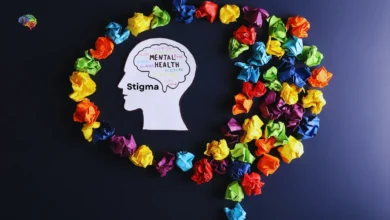Why You Can’t Focus: Hidden Signs of Burnout vs. Stress

Introduction: Why You Can’t Focus Anymore Might Not Be Your Fault
Ever sat down to work and somehow ended up reorganizing your sock drawer? If you’re constantly zoning out, feeling mentally foggy, and wondering why you can’t focus, you’re not alone. Millions of people are silently battling attention issues—but the root cause might be deeper than you think. It could be burnout creeping in, or stress that’s overstayed its welcome.
In this article, we’ll unpack the not-so-obvious reasons behind poor focus, break down the difference between burnout and stress, and give you practical, no-nonsense tips to reboot your brain.
What Happens When You Can’t Concentrate? Understanding Brain Fog
Focus isn’t just about trying harder. When your brain’s running on fumes, concentrating on anything (even something fun) becomes a chore. This lack of mental clarity—aka brain fog—is often your brain’s way of waving a red flag.
If you’re experiencing mental fatigue, chronic distraction, or trouble staying on task, it’s time to dig deeper into why you can’t focus.
Common Symptoms of Focus Loss and Mental Fatigue
Not sure if what you’re feeling is normal? Here’s how to tell:
- Forgetting names, tasks, or appointments
- Feeling overwhelmed by simple decisions
- Zoning out mid-conversation
- Trouble starting or finishing tasks
- Reading something and immediately forgetting it
These aren’t just quirky brain blips. They’re signals—often linked to stress or burnout—that your brain needs a reset.
Burnout vs. Stress: The Hidden Culprits Behind Why You Can’t Focus
Both burnout and stress can hijack your ability to concentrate, but they affect your mind in different ways.
Burnout: When Your Brain Taps Out
Burnout doesn’t just make you tired—it drains your mental battery until it’s flashing “0%.” It happens when you’ve been under pressure too long with too little rest.
Signs burnout is stealing your focus:
- Emotional numbness or detachment
- Feeling like you’re just going through the motions
- No motivation, even for things you used to enjoy
- Trouble concentrating for more than a few minutes
“Almost everything will work again if you unplug it for a few minutes… including you.”
— Anne Lamott
Stress: The Mental Overload That Feels Like a Pinball Machine
Stress, in smaller doses, can actually sharpen focus. But when it becomes constant, it starts chipping away at your cognitive control.
Stress-related focus issues include:
- Racing thoughts
- Restlessness or irritability
- Sleeping poorly
- Feeling mentally scattered or forgetful
Whether you’re burned out or stressed out, both can explain exactly why you can’t focus anymore—and knowing the difference is step one toward fixing it.
Top 7 Sneaky Reasons You’re Losing Focus
- Mental Multitasking Mayhem :v Trying to do everything at once actually slows your brain down. Instead of finishing one thing well, you end up half-doing everything poorly.
- Chronic Emotional Exhaustion : If you’re always the strong one or the helper, your emotional energy gets depleted fast—leaving your brain too drained to concentrate.
- Poor Sleep Habits : Sleep-deprived brains are foggy brains. Focus depends on rest. No amount of coffee can replace deep, uninterrupted sleep.
- Constant Digital Distraction : Phones, pings, and scrolling hijack attention. If you can’t concentrate, look at how often you’re interrupted—and how fast you reach for your phone.
- Anxiety and Depression : Mental health conditions like anxiety or depression are silent focus-killers. They make your brain either overactive (can’t settle) or underactive (can’t start).
- No Mental Downtime : Being “on” all the time—without any true break—fries your focus. Think of your brain like a muscle: it needs rest days too.
- Bad Nutrition and Dehydration : Dehydration and poor food choices directly impact brain performance. No fuel = no focus.
How to Rebuild Focus: Real-World Solutions That Work
So, how do you reset your brain when you feel like you can’t focus at all? Start with small shifts:
- Prioritize Quality Sleep : Aim for 7–9 hours. Avoid screens an hour before bed and stick to a routine. Your brain will thank you with better focus tomorrow.
- Take Real Breaks : Not Instagram scrolls—actual breaks. Go outside. Stretch. Meditate. Sit in silence. Let your mind reset.
- Control Digital Noise : Turn off non-urgent notifications. Use focus apps if needed. Create pockets of uninterrupted work time.
- Move Your Body : A 15-minute walk, yoga session, or dance break boosts brain clarity. Exercise helps regulate stress hormones too.
- Eat to Focus : Add omega-3s, leafy greens, and protein. Ditch the sugar crashes. And hydrate like your brain depends on it—because it does.
- Set Boundaries : Say “no” to overcommitting. Protect your energy like it’s your Wi-Fi signal—don’t let everyone use it up.
- Seek Help If Needed : Therapy or counseling can help you identify whether it’s stress, burnout, or something deeper. Don’t hesitate to reach out.
“You don’t have to see the whole staircase—just take the first step.”
— Martin Luther King Jr.
Conclusion: Clarity Starts with Compassion
If you’ve been struggling with attention issues, there’s no shame in it. Whether it’s burnout, stress, or mental overload, the reasons why you can’t focus are valid. And they’re fixable.
You’re not lazy. You’re not broken. You’re just dealing with a brain that needs a little breathing room.
Take a breath. Start small. And give yourself the same patience you’d offer a friend.




Alright, so I gave 7700bet777 a whirl. The platform seems solid and the odds are competitive. Definitely worth checking out if you’re looking for a new spot to place your bets. Good times! –> 7700bet777
I have been absent for some time, but now I remember why I used to love this blog. Thanks, I’ll try and check back more often. How frequently you update your website?
Some times its a pain in the ass to read what blog owners wrote but this website is really user genial! .